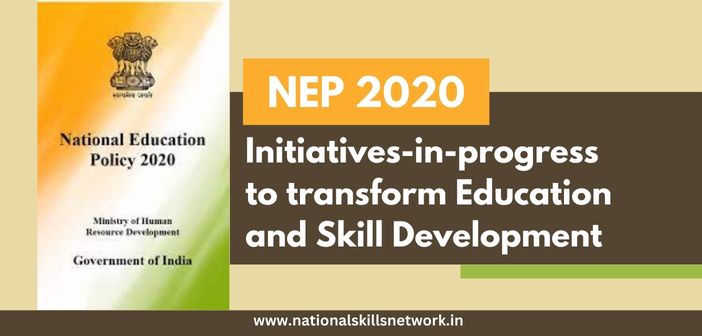The National Education Policy 2020 (NEP 2020) has paved the way for transformative changes in the education sector, marked by several significant initiatives and accomplishments over the past three years.
One of the pivotal aspects of NEP 2020 is its increased investment in education, aspiring for the Central Government and State Governments to allocate 6% of the GDP towards education. The policy also promotes private philanthropic engagement in the education sector. The Ministry of Education (MoE) has demonstrated its commitment by raising the budget allocation from Rs. 99,311.52 crore in 2020-21 to Rs. 1,12,899.47 crore in 2023-24, marking an impressive 13.68% increase. This financial commitment is reflected in the increasing trend of total expenditure on education as a percentage of GDP, which reached 4.64% in 2020-21.
NEP 2020 underscores the importance of global collaborations in education. To this end, the policy advocates for research and teaching partnerships with foreign institutions, facilitating student and faculty exchanges. It encourages renowned Indian universities to establish campuses overseas and, reciprocally, allows select top-ranking foreign universities to operate in India. The UGC has issued regulations for academic collaboration between Indian and foreign institutions, promoting academic excellence.

The initiative to establish ‘Institutions of Eminence’ (IoE) has led to the designation of 12 public and private institutions that have excelled in academia and research. These institutions have been granted special status under the World Class Institutions Scheme, enhancing their global recognition.
In an effort to tap into global expertise, initiatives like the Global Initiative for Academic Network (GIAN) and the Scheme for Promotion of Academic and Research Collaboration (SPARC) have been introduced, enabling collaboration between Indian and foreign institutions for mutual academic advancement.
Furthermore, groundbreaking partnerships have been forged, including establishing an IIT campus in Zanzibar, Tanzania, and signing an MoU to establish an IIT Delhi campus in Abu Dhabi, reflecting India’s growing influence in global education. Foreign universities have been invited to set up campuses in the Gujarat International Finance Tec-City (GIFT City) for specialized courses, contributing to developing high-end human resources for financial services and technology.
The introduction of frameworks like the National Digital Education Architecture (NDEAR), the National Credit Framework (NCrF), and the National Higher Education Qualification Framework (NHEQF), along with guidelines for academic collaborations, credit transfer, and multiple entry and exit options, showcase the holistic transformation underway. The inclusion of the Indian Knowledge System (IKS) in curricula and guidelines for heritage-based courses emphasizes India’s rich cultural heritage in education.
Here are some of the achievements and initiatives that have taken place over the past three years since the announcement of the NEP 2020:
- PM SHRI Schools Upgrade: Released Rs. 630 Crore as the first installment for upgrading schools under the PM SHRI initiative, targeting more than 14,500 schools with a total cost of Rs. 27,360 crores over five years.
- NIPUN Bharat: Introduced the National Initiative for Proficiency in Reading with Understanding and Numeracy (NIPUN Bharat) to ensure foundational literacy and numeracy by the end of Grade 3.
- Vidya-Pravesh: Launched guidelines for a three-month play-based school preparation module called Vidya-Pravesh to ease children’s transition to formal education.
- PM e-VIDYA: Integrated digital/online/on-air education efforts under PM e-VIDYA, including DIKSHA (Digital Infrastructure for Knowledge Sharing) as a unified platform for e-Books and e-Contents.
- National Curriculum Framework Foundational Stage (NCFFS): Introduced NCFFS and Jadui Pitara, tailored play-based learning teaching material for children aged 3 to 8.
- NISHTHA 1.0, 2.0, and 3.0: Rolled out the National Initiative for School Heads’ and Teachers’ Holistic Advancement (NISHTHA) in multiple phases, providing integrated teacher training for various stages of school education.
- National Digital Education Architecture (NDEAR): Introduced NDEAR to create a unified national digital infrastructure to catalyze the education ecosystem.
- New India Literacy Programme (ULLAS): Implemented the ULLAS scheme targeting non-literates aged 15 years and above, aiming to enhance literacy across the country.
- Academic Bank of Credit: Initiated the Academic Bank of Credit to facilitate the transfer of credits between educational institutions.
- Curriculum and Credit Framework: Developed a curriculum and credit framework for undergraduate programs, enabling flexibility and better learning pathways.
- Multiple Entry and Exit: Introduced the concept of multiple entry and exit in academic programs offered by higher education institutions.
- Revised ODL/Online Education Regulation: Altered regulations for Open and Distance Learning (ODL) and online education, allowing up to 40% of course credits to be completed using the SWAYAM platform.
- Guidelines for Professor of Practice: Issued guidelines to enable Higher Education Institutions (HEIs) to collaborate with industry experts as Professors of Practice.
- Regulations on Academic Collaboration: Introduced rules to facilitate academic collaboration between Indian and foreign higher education institutions.
- Autonomous Status for Colleges: Issued guidelines for granting Autonomous Status to colleges, promoting institutional autonomy.
- Guidelines for International Student Admissions: Formulated guidelines for admitting international students to undergraduate and postgraduate programs in Indian HEIs.
- D. Degree Standards and Procedures: Established regulations for minimum standards and procedures for awarding PhD degrees.
- Incorporation of Indian Knowledge: Introduced guidelines for incorporating Indian Knowledge in higher education curricula, emphasizing indigenous wisdom.
- Guidelines for Indian Knowledge System (IKS) Training/Orientation: Developed guidelines for training faculty on the IKS, promoting its integration into education.
- Heritage and Culture-based Courses: Provided guidelines for introducing of courses based on Indian heritage and culture.
- Artists/Artisans-in-Residence: Established guidelines for the empanelment of Artists/Artisans-in-Residence in higher educational institutions.
- IKS Centers: Established 32 IKS centres to catalyze research, education, and dissemination of indigenous knowledge.
Also read: Initiatives by the government to strengthen skill based education under NEP 2020
These achievements over the past three years reflect the comprehensive and dynamic nature of NEP 2020, fovusing on improving education, research, collaboration, and inclusivity across all levels of learning.












